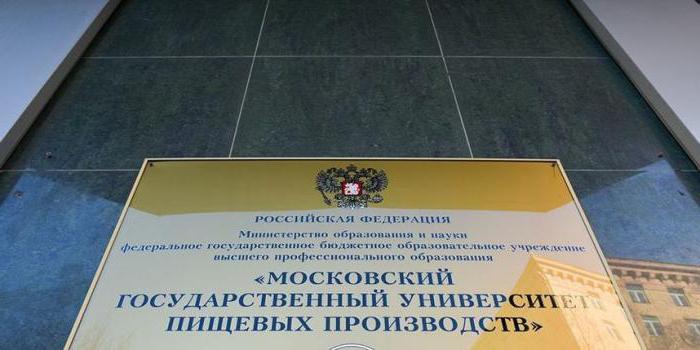A person graduating from school enters into an independent life. It begins with the choice of educational institution. For Moscow applicants, there are many options for continuing their studies. One of the universities worthy of attention is Moscow State University of Food Production. He is one of the largest educational organizations in our country working in the engineering field.
About the university: the period of existence before the Great Patriotic War
According to documents, the history of the institution began in 1930. The country's food industry needed workers and engineering personnel. In this regard, the Institute of Technology of Flour and Grain was opened in Moscow. Prior to the outbreak of war, the university was enlarged. It included several educational institutions.
The Great Patriotic War dealt a serious blow to the institute. Many university employees and students went to the front. The educational institution was also negatively affected by the enormous damage to the food industry. During the war years, a huge number of enterprises were destroyed.
An educational institution in the post-war years and the modern period
The institute began to develop only in the postwar years, when they began to restore the national economy. New specialties appeared, the teaching staff expanded. In 1992, the institute became an academy, and after another 5 years - a university. So there was Moscow State University of Food Production (MGUPP).
Today, a higher educational institution is an educational organization with rich experience in training specialists. The university produces the personnel necessary for the food and processing industries.
Moscow State University of Food Production: faculties (institutes) in the structure
The organizational structure of the university consists of 5 institutes:
- Bioindustry of food and innovative technologies. This structural unit is a large part of the university. It graduates specialists who are able to improve existing technologies, develop new equipment, and improve the mechanisms of managing enterprises.
- Management and economics in the food industry. Managers and economists are needed in all areas of modern life. The food industry is no exception. The Moscow State University of Food Production (Moscow) entrusted the Institute of Management and Economics with the training of such specialists.
- High-tech food production and biotechnology. This structural unit graduates specialists who are able to work in the field of high technology. Graduates of the educational organization are engaged in the manufacture of food products, the development of technological processes of food production.
- Food and biological safety, veterinary and sanitary expertise. The Institute provides training in such areas as "Veterinary Medicine", "Veterinary Sanitary Expertise", "Biology". Graduates in their further professional activities are engaged in preserving the health of animals and humans, conducting veterinary and sanitary examinations.
- Medical and social technology. This institute accepts doctors for internship, residency, and graduate studies. The proposed educational programs are “Surgery”, “Dermatovenerology”, “Neurology”, “Psychiatry”, “Therapy”, etc.

Admission to the university: acquaintance with passing grades
Moscow State University of Food Production is an educational institution that is quite possible to enter. Confirmation of these words is the statistics collected for the 2016 admission campaign:
- At the baccalaureate, such a direction as “Biology” was in high demand among applicants. The competition here was 17.8 people for 1st place. Passing score was 164.
- In the next place by popularity was the direction “Technosphere safety”. 12.6 people applied for the first place at the university, who submitted documents to the Moscow State University of Food Production. Passing score - 126.
- The highest competition was in the direction of "Organization of catering and product technology" - 10.4 people per place. Passing score was also quite large. He turned out to be equal to 187.
Structural units that applicants need to know about
Moscow State University of Food Production is not the only Muscovite. Among students there are many nonresident residents, foreigners. A campus was built for them. It creates comfortable conditions for living. The campus consists of 5 buildings of dormitories of the corridor and block type.
Another important structural unit of the university is the library and information center. It stores over 900 thousand publications in many industries. There are books, monographs, brochures, articles, dissertations and various other works of scientists, specialists and teachers of the educational institution.
Opportunities for University Students
People who enter the university can not only spend time with books and notebooks. Students have great opportunities in the development of creative abilities and leadership skills. Those interested can join the ranks of members of the student council. He is a team of students, puzzled by the creation of various clubs and sections for other students of the university.
Those people who are prone to creativity, not leadership, can find interesting activities for themselves in:
- music club;
- intellectual club;
- chess club;
- sports sector;
- vocal club, etc.
In conclusion, it is worth noting that Moscow State University of Food Production is a university with a rich history and traditions. Currently, there are about 7 thousand students. Over the years, the educational organization has released more than 40 thousand specialists for the food and processing sectors of the agro-industrial complex. Most of them began to work by profession. Some have built an excellent career, became candidates, doctors of sciences.